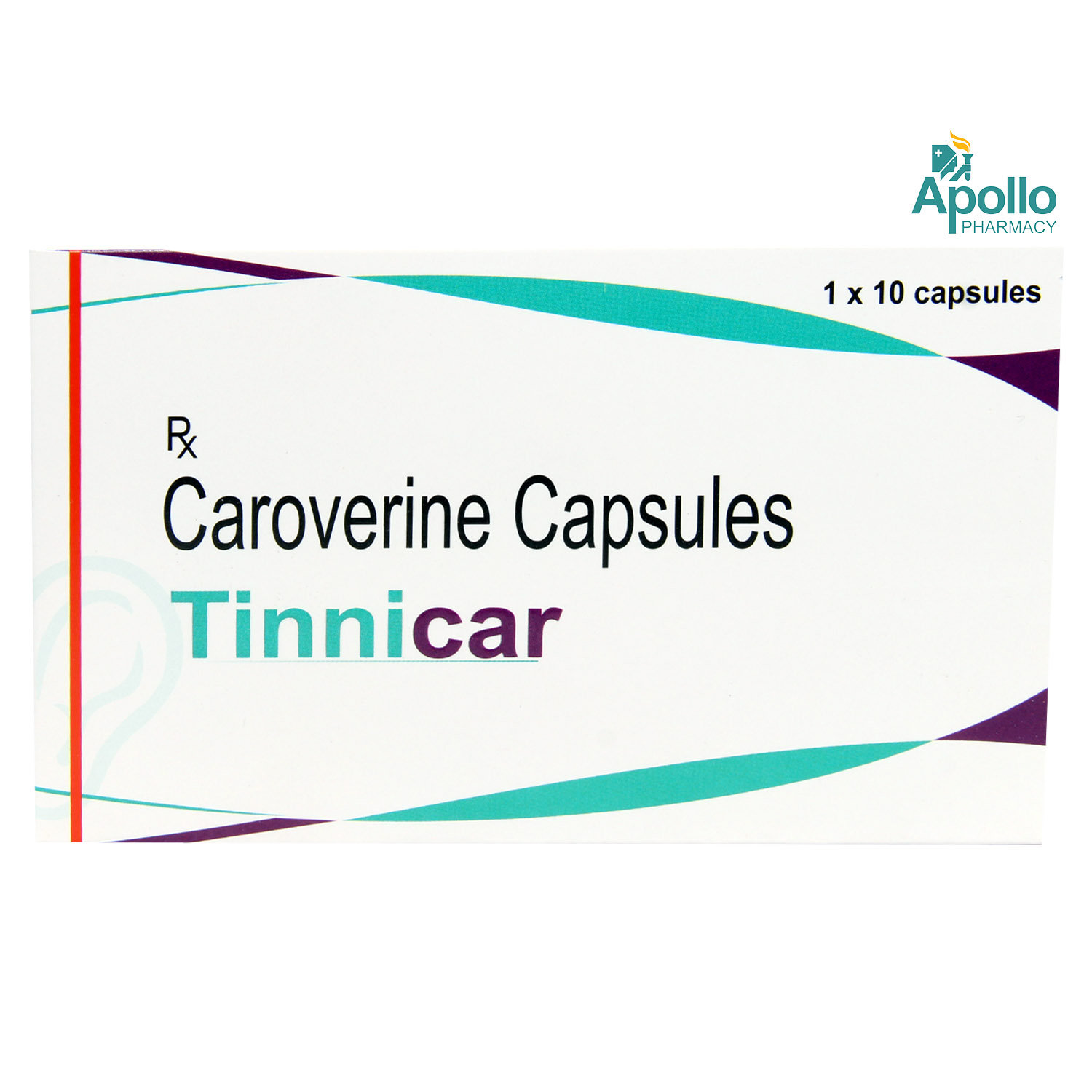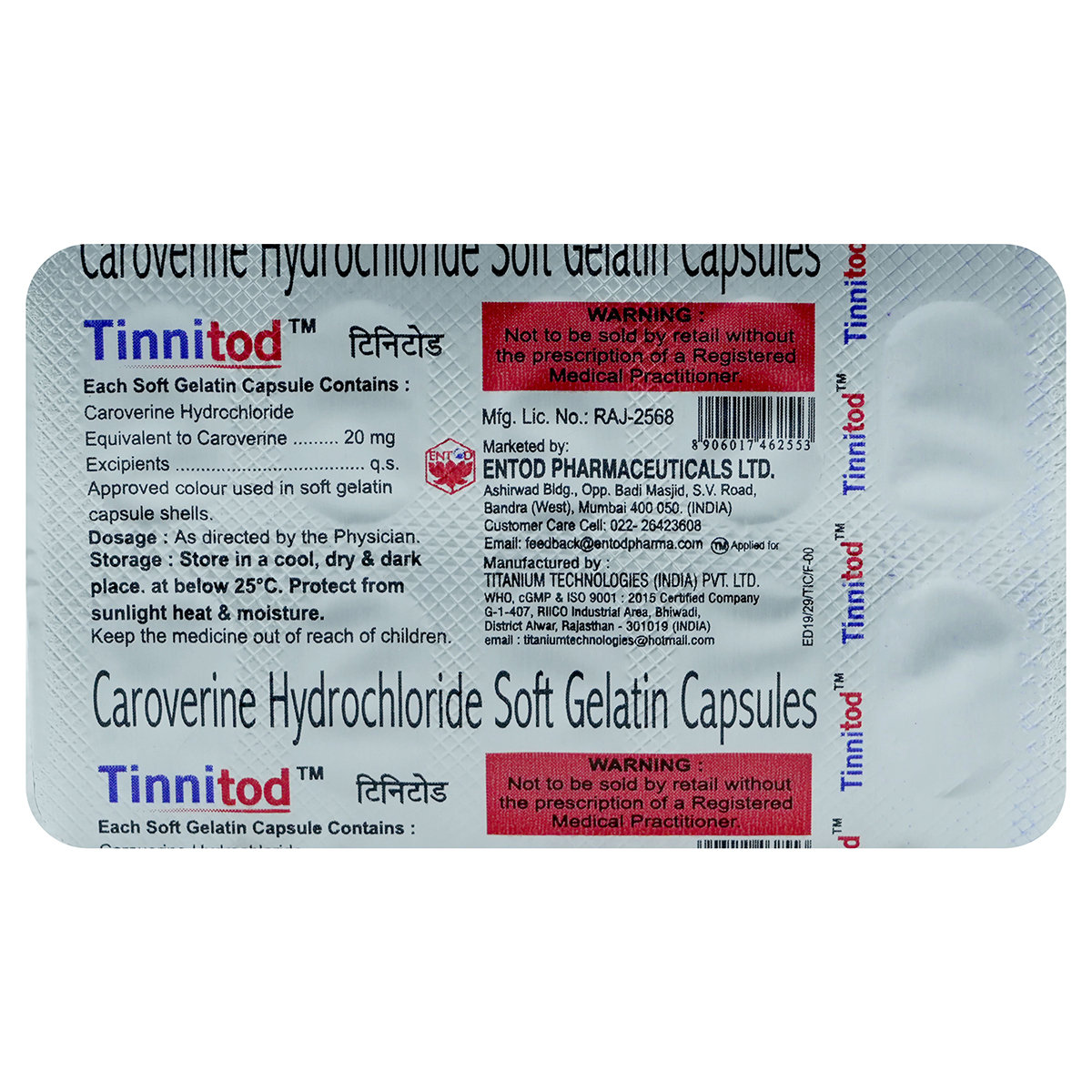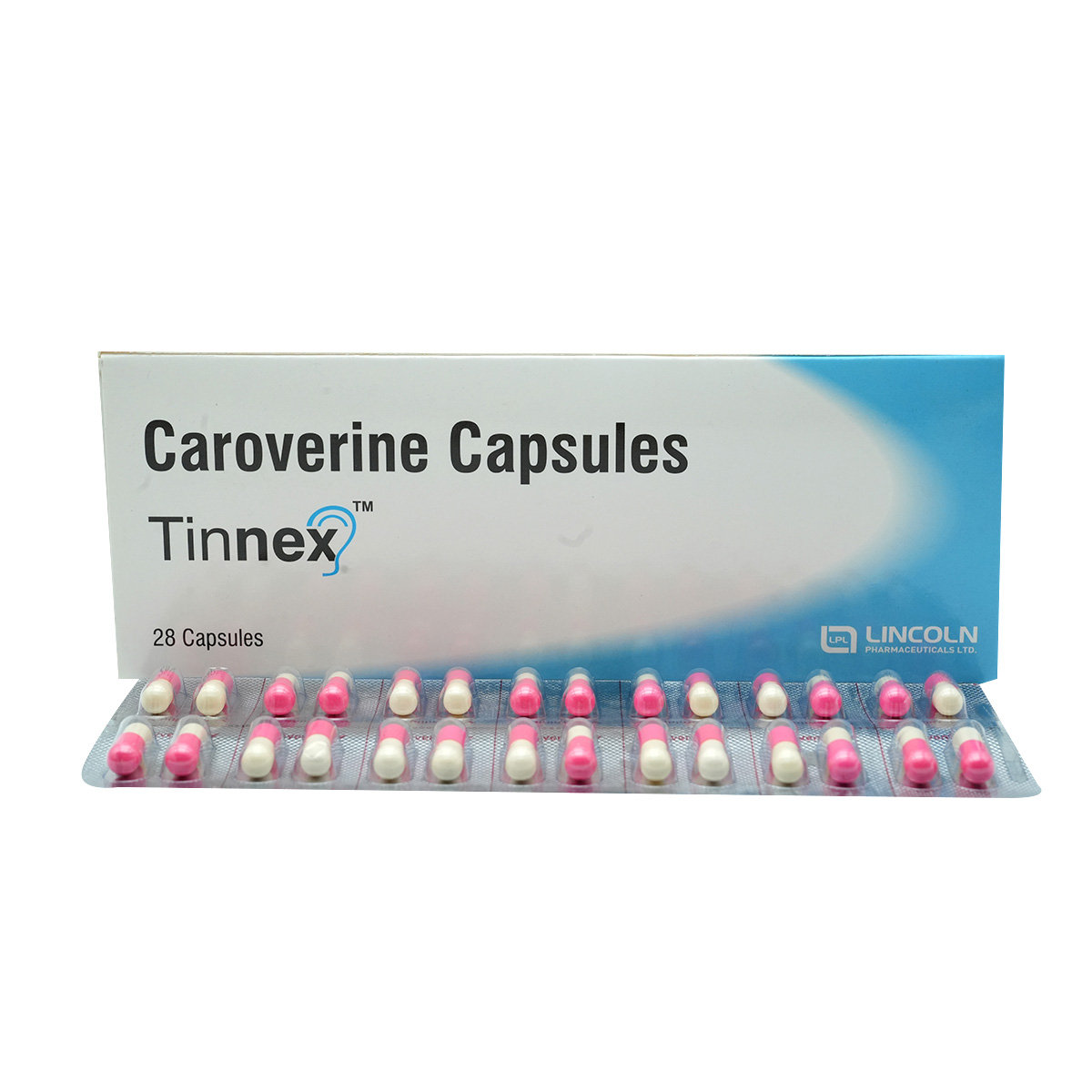Caroverine
About Caroverine
Caroverine is used to treat smooth muscle spasms and tinnitus. Additionally, Caroverine may also be used to treat vertigo, cerebral circulatory disorders and neurological disorders.
Caroverine contains caroverine, which works by blocking the action of a chemical messenger in the brain (glutamate), thereby reducing the severity of tinnitus. It also acts as a smooth muscle relaxant with calcium-channel blocking properties, thereby relieving smooth muscle spasms.
This medicine may cause certain common side effects such as headache, nausea, dryness in the mouth and dizziness. Caroverine resolves these side effects on its own. Contact your doctor right away if these symptoms do not go away or worsen.
Do not take Caroverine if you are allergic to any of its components. Inform the doctor if you are pregnant or planning to get pregnant/breastfeeding before taking Caroverine. Caroverine should not be used in glaucoma or prostatic hypertrophy conditions.
Uses of Caroverine
Medicinal Benefits
- Caroverine is effective in managing tinnitus, reducing the intensity and frequency of ringing or buzzing sounds in the ears, thereby improving quality of life.
- It helps treat vertigo by stabilizing the vestibular system, relieving spinning sensations, dizziness, and loss of balance.
- By restoring normal inner ear function, Caroverine supports better posture and reduces the risk of falls and accidents in individuals with balance disorders.
- It also has mild muscle relaxant effects, which help relieve muscle tension and discomfort associated with vertigo or tinnitus.
- Caroverine is generally well-tolerated, with minimal side effects, and is considered safe when used as directed.
Directions for Use
- Caroverine can be taken with or without food, as advised by a doctor.
- It is better to take Caroverine at a fixed time each day for consistency or as directed by a doctor.
- Swallow it as a whole with a glass of water.
- Do not crush, chew, or break it.
Storage
Side Effects of Caroverine
- Headache
- Nausea
- Dry mouth
- Dizziness
- Blurred vision
- Urinary retention
- Difficulty breathing
- Rash
Drug Warnings
- Before starting with Caroverine, inform your doctor if you are allergic to any of its components.
- Tell your doctor if you are pregnant or planning to get pregnant/breastfeeding.
- Caroverine should be used with caution in patients with hyperthyroidism, cardiac insufficiency, and muscular weakness in the elderly and disabled.
- Caroverine should not be used in glaucoma or prostatic hypertrophy.
- You should also avoid taking this medicine if you have acute stomach & intestinal ulcers.
- Inform your doctor if you have gastritis, liver damage or acute voiding disorder.
- Let your doctor know if you are taking any other medicines, including supplements and herbal products.
Drug Interactions
Drug-Drug interactions: Caroverine may interact with anti-HIV (Atazanavir), ACE inhibitors (Captopril), potassium-sparing diuretics (Amiloride), calcium channel blockers (Amlodipine), anti-depressants (Citalopram).
Drug-Food interactions: Caroverine may interact with alcohol.
Drug-Disease interactions: Caroverine should be used with caution in patients with glaucoma, hyperthyroidism, cardiac insufficiency, muscular weakness and prostatic hypertrophy.
Drug-Drug Interactions Checker List:
Safety Advice

Alcohol
cautionThe interaction of Caroverine with alcohol is unknown. Hence, consult your doctor before alcohol consumption.

Pregnancy
cautionCaroverine is not recommended for use in pregnant women unless absolutely necessary. Your doctor will advise this medicine only if the benefits outweigh the risks.

Breast Feeding
cautionCaroverine is not recommended for use in breastfeeding women unless absolutely necessary. Your doctor will advise this medicine only if the benefits outweigh the risks.

Driving
cautionIt is not known whether Caroverine alters the ability to drive. Do not drive if you experience any symptoms that affect your ability to concentrate and react.

Liver
cautionCaroverine can be used with caution in patients with liver diseases. Take Caroverine only under the supervision of a healthcare professional. Your doctor may adjust the dose based on your condition.

Kidney
cautionCaroverine can be used in caution with kidney diseases. Take Caroverine only under the supervision of a healthcare professional. Your doctor may adjust the dose based on your condition.

Children
cautionCaroverine is not recommended for use in children below 12 years of age as the safety and efficacy of use is not clinically established.
Habit Forming
Diet & Lifestyle Advise
- The Mediterranean Diet is best for almost everyone, including those of us who suffer from tinnitus. It combines daily exercise with plenty of whole-grain bread or pasta, fruits, vegetables, olive oil, cheese and yoghurt. Fish, poultry, eggs and sweets can be used several times per week, while red meat is allowed several times a month.
- Take citrus fruits, walnuts, berries, leafy greens, fatty fish, beets and pomegranates in your diet.
- Quit smoking and try to keep away the stress.
- When highly troubled by tinnitus, try wearing a tinnitus suppressor or masker. This is a device that fits in the ear like a hearing aid and presents a more pleasant sound.
Special Advise
- You should not take Caroverine if you are hypersensitive to this medicine. You should also avoid taking this medicine if you have acute stomach & intestinal ulcers.
- Inform your doctor about your complete medical history, as Caroverine may worsen the symptoms of a few diseases like benign prostatic hyperplasia (BPH) and glaucoma.
Patients Concern
Disease/Condition Glossary
Tinnitus: It is a condition in which ringing or buzzing noise in one or both ears may be constant or come and go, often associated with hearing loss. Common causes are exposure to loud sounds, whiplash, head injuries, too much earwax, or medication side effects. Symptoms include ringing, buzzing, roaring, clicking, hissing, and humming.
Smooth muscle spasms: Smooth muscle can also go into spasm, which means involuntary contraction of a muscle. When a hollow structure filled with air or fluid is squeezed by a muscle spasm, significant pain may occur since the fluid or air cannot be compressed. For example, smooth muscle in the intestinal wall can go into spasm, causing waves of pain called colic. Causes of spasms include when a muscle is overused, tired, previously injured, or strained. Symptoms are colicky pain and muscle weakness.
Cerebral circulatory disorders: Cerebral circulation is the blood flow in your brain. It’s important for healthy brain function. Circulating blood supplies your brain with the oxygen and nutrients it needs to function properly. When your cerebral circulation is impaired, less oxygen and glucose reach your brain. This can cause brain damage and neurological problems. Some conditions related to impaired cerebral circulation include stroke (blood supply to part of your brain is interrupted or reduced), cerebral haemorrhage (uncontrolled bleeding in the brain), cerebral hypoxia (reduced supply of oxygen), and cerebral oedema (accumulation of fluid).
FAQs
Caroverine belongs to the class antispasmodics, which is used to treat smooth muscle spasms and tinnitus. This medicine is also used in the treatment of certain cerebral circulatory disorders.
Caroverine is an oto-neuroprotective (inner ear protective) medication. It works by blocking the action of a chemical messenger in the brain (glutamate), thereby reducing the severity of tinnitus, and it also acts as a smooth muscle relaxant with calcium-channel blocking properties used in conditions associated with painful smooth muscle spasm.
Common side effects of Caroverine include headache, nausea, dryness in the mouth, dizziness, blurred vision, urinary retention, difficulty breathing, and rash.
You should not take Caroverine if you are hypersensitive to this medicine. You should also avoid taking this medicine if you have acute stomach and intestinal ulcers. You should be cautious if you have gastritis, liver damage or acute voiding disorder.
Caroverine acts as a smooth muscle relaxant with calcium-channel blocking properties, used in conditions associated with painful smooth muscle spasm.
No, Caroverine is not available over the counter. It can only be taken if prescribed by a doctor. Take it only under the supervision of a healthcare professional.
Caroverine due to its smooth muscle relaxant effect may rarely worsen the symptoms of benign prostatic hyperplasia (BPH) and glaucoma. Consult your doctor immediately if the symptoms worsen.
Caroverine is not recommended for use in pregnant women unless absolutely necessary. Your doctor will advise this medicine only if the benefits outweigh the risks. Please consult the doctor if you are pregnant.
Caroverine should be swallowed as a whole with water; do not crush or chew it.
Caroverine should not be taken if you are hypersensitive to this medicine or if you have acute stomach & intestinal ulcers. You should be cautious if you have gastritis, liver damage or acute voiding disorder.
Caroverine is not recommended for use in children below 12 years of age as the safety and efficacy of use is not clinically established.
Caroverine may cause side effects such as headache, nausea, dryness in the mouth and dizziness. Caroverine resolves these side effects on its own. Contact your doctor right away if these symptoms do not go away or worsen.
To prevent any interactions, please consult the doctor before taking other medicines with Caroverine, particularly HIV medicines, blood pressure-lowering medicines and anti-depressants.
Store Caroverine at room temperature, in a dry place. Keep out of sight and reach of children.






